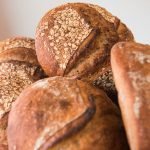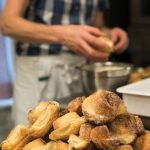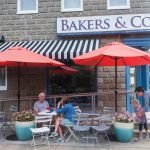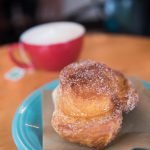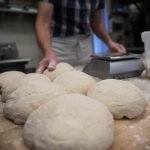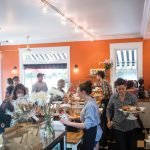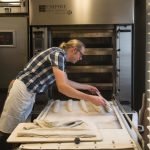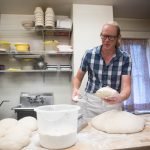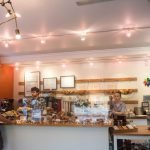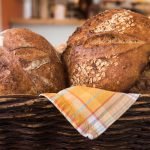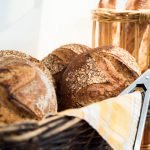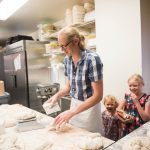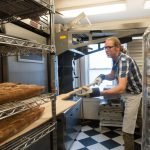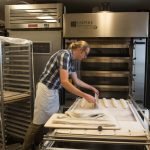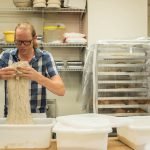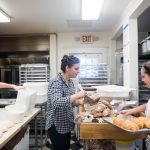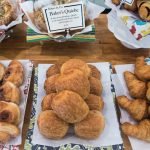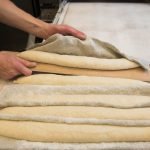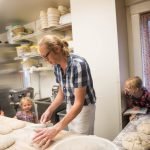+ By Leigh Glenn + Photos by Alison Harbaugh
The bread names offer a bit of fanciful fun: Rough & Ready (with its sunflower seeds, millet, flax, oats, and sesame), Little Rosie (with rosemary), Carried Away (with caraway), and Q&A (for its inclusion of quinoa and amaranth). Taste them and you’d think that Bakers & Co. owners Lucy Montgomery and Chris Simmons have been baking for a lifetime.

Chris Simmons, owner and baker, prepares bread dough as fresh baguettes cool on the bakery racks early in the morning at Bakers and Co. in Eastport.
Photo by Alison Harbaugh
For the husband-and-wife team, the path to a stand at the Saturday Anne Arundel County farmers market in 2007, and then the opening of their café in Eastport in 2012, has resembled a levain, a bread starter. Since they began baking, they’ve used the same levain—something they’ve lovingly tended and has grown, deepened, and become more complex with age. Today, they offer not only naturally leavened breads, but also muffins, scones, croissants, pasties, quiche, and even soups made from family recipes.
Montgomery’s foray into baking occurred while attending St. John’s College. She needed to keep herself home so that she would be motivated to do her seminar readings. Her loaves were similar to what her mother made and what she enjoyed growing up. “Trying to master my mother’s whole wheat, I managed to make terribly heavy bricks,” she says. “Still, they tasted real. Which, honestly, is why we make bread—real food simply tastes good.”
Montgomery met Simmons at St. John’s. They were often competitors in the kitchen, seeing who could make what, and better. This applied to breads, viennoiserie (pastries), and Christmas pudding. They took up bread baking on a whim one winter, after they’d read lots of books about it and knew what they liked. After a while, Simmons took a few classes at King Arthur Flour Baking School in Vermont, where he studied with master baker Jeffrey Hamelman. This was helpful, not only to gain knowledge of bread behavior and techniques, but also to help create a buffer against the inevitably recalcitrant processes involved in baking: “To paraphrase [Hamelman]: ‘The best thing about being a baker, whether you have a great bake or not-so-great bake, you get to do it all over again tomorrow,’” says Montgomery.
The lack of predictability when it comes to a natural levain could send anyone running to the grocery store for a packet of dry or instant yeast, but not Montgomery and Simmons. For them, baking is a process to be managed. They think of it as a type of game—one they meet with heaps of humor to accommodate the challenges as well as their “moments of glory.”
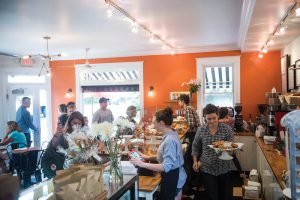
A busy Friday morning at Bakers and Co. in Eastport. Customers come in for fresh baked breads, pastries, soups and coffee and tea drinks.
If needed…behind the counter: Hannah Hall, Emily Tahaburt, Joel Bourland & owner Lucy Montgomery (with tray)
Photo by Alison Harbaugh
Says Montgomery, “There are always the latest gadgets and recipes for making a convenient yeasted loaf of bread, but the results are not the same as bread that takes time. Natural levain demands a level of care that not all of us are capable of on a daily basis. There is science and there is art.”
In recent years, bread has gotten a bad rap in some circles. But the questions are: What kind of bread? What kinds of ingredients? How is it made? “True bread is flour, water, salt,” says Montgomery. “Natural, wild yeast is what is attracted to these ingredients.” And all together, they make magic.
Even though many bakeries use commercial yeast and starters in combination, says Simmons, Bakers & Co. uses only natural starters for its breads and no preservatives or conditioners. “We are at the mercy of a fickle, living thing that dictates your schedule—a bit of a diva amidst the full orchestra of viennoiserie, muffins, cookies, galettes, etc.,” says Simmons. When using a natural starter, everything has to be just right. “It’s all about time, temperature, general activity. You need it to behave at a specific point and specific time. Levain has a life of its own, and things are always changing. Despite your best efforts, you are always having to make adjustments. You are constantly gauging time, temperature, humidity,” he explains. The payoff is worth it, looking at the bench full of shaped boules in the baskets ready for their final proof.
The proof is also found in the community of people that has sprung up around Bakers & Co.—whether at the Saturday farmers market or at the café, which is open Wednesdays through Sundays—people are always running into others they know and conversing. Montgomery, who handles the farmers market, takes deep inspiration from the customers, from Jim monitoring his garden for the first tomato of the season to blush, and Juanita and Pat, who share their hopes for glimpsing a brown thrasher on their bird-watching adventures, to Simon and Ruth, who recommend different recordings of Schubert’s Winterreisse, and Mrs. Barbera, whose smile is joy incarnate.

Owners Lucy Montgomery and Chris Simmons work with baker Stephanie Squires during their busy morning baking routine at Bakers and Co. in Eastport.
Photo by Alison Harbaugh
“Bread is about community,” says Montgomery. “It’s not surprising that the etymology of ‘companion’ comes from the person you break bread with. By baking in a community, it’s really a way of taking care of your friends and neighbors.” This is what saddens her about people’s current obsession with dietary and lifestyle food choices. “Sure, it’s valid, but it does sometimes make food an enemy,” she says. “Carbs, gluten, whatever is the latest evil, and what people substitute to avoid these things [are] perhaps equally suspect in excess. As my granny always said, ‘A little of what you fancy does you good!’ Or, if you want to be more highfalutin about it—it’s Aristotle’s sense of the middle way, between the extremes. If you don’t eat in excess, there is a lot to enjoy.” █
- Chris Simmons, owner and baker, prepares bread dough as fresh baguettes cool on the bakery racks early in the morning at Bakers and Co. in Eastport. Photo by Alison Harbaugh
- A busy Friday morning at Bakers and Co. in Eastport. Customers come in for fresh baked breads, pastries, soups and coffee and tea drinks. If needed…behind the counter: Hannah Hall, & Joel Bourland. Photo by Alison Harbaugh
- A variety of fresh baked breads at Bakers and Co. in Eastport. Photo by Alison Harbaugh
- Chris Simmons, owner and baker, prepares bread dough as fresh baguettes cool on the bakery racks early in the morning at Bakers and Co. in Eastport. Photo by Alison Harbaugh
- Gwen and Julia, daughter of Chris Simmons and Lucy Montgomery, owners of Bakers and Co. help out during the morning rush by bringing out a basket of fresh baked baguettes to the front of the shop. Photo by Alison Harbaugh
- Baker and owner of Bakers and Co., Chris Simmons prepares the popular Market Buns for the morning customers. Photo by Alison Harbaugh
- Owner, Lucy Montgomery and her youngest daughter Gwen water the flowers out from of their Eastport Bakery, Bakers and Co. Photo by Alison Harbaugh
- A Market Bun and a cup of tea makes for a wonderful morning treat at Bakers and Co. in Eastport. Photo by Alison Harbaugh
- Bakers and Co. owner and baker, Chris Simmons, prepares bread dough as part of his morning routine at the bakery. Photo by Alison Harbaugh
- A busy Friday morning at Bakers and Co. in Eastport. Customers come in for fresh baked breads, pastries, soups and coffee and tea drinks. If needed…behind the counter: Hannah Hall, Emily Tahaburt, Joel Bourland & owner Lucy Montgomery (with tray) Photo by Alison Harbaugh
- Chris Simmons, owner and baker, prepares fresh baguettes early in the morning at Bakers and Co. in Eastport. Photo by Alison Harbaugh
- A busy Friday morning at Bakers and Co. in Eastport has owner and baker Chris Simmons preparing bread dough while his oldest daughter Julia reads nearby. Photo by Alison Harbaugh
- Almond Croissants at Bakers and Co. in Eastport. Photo by Alison Harbaugh
- Baker Stephanie Squires prepares pastries with tomatoes and cheese at Bakers and Co. in Eastport. Photo by Alison Harbaugh
- Chris Simmons, owner and baker at Bakers and Co. in Eastport. Prepares tray of pastries early in the morning at the bakery. Photo by Alison Harbaugh
- Bakers and Co. owner and baker, Chris Simmons, prepares bread dough as part of his morning routine at the bakery. Photo by Alison Harbaugh
- Bakers and Co. in Eastport. Photo by Alison Harbaugh
- A variety of fresh baked breads at Bakers and Co. in Eastport. Photo by Alison Harbaugh
- A variety of fresh baked breads at Bakers and Co. in Eastport. Photo by Alison Harbaugh
- Daughter Gwen and Julia watch on as their father, Chris Simmons prepares bread dough at family-owned Bakers and Co. in Eastport. Photo by Alison Harbaugh
- Chocolate Croissants cool on baking racks at Bakers and Co. in Eastport. Photo by Alison Harbaugh
- Bakers and Co. owner and baker, Chris Simmons, takes a batch of freshly made baguettes out of the oven during the morning bakery shuffle as he prepares the morning breads and pastries. Photo by Alison Harbaugh
- A busy Friday morning at Bakers and Co. in Eastport. Customers come in for fresh baked breads, pastries, soups and coffee and tea drinks. If needed…behind the counter: Joel Bourland &Hannah Hall Photo by Alison Harbaugh
- Bakers and Co. owner and baker, Chris Simmons, adds a coat of flour to bannetons (bread proofing baskets) as part of his morning routine at the bakery. Photo by Alison Harbaugh
- Chris Simmons, owner and baker, prepares fresh baguettes early in the morning at Bakers and Co. in Eastport. Photo by Alison Harbaugh
- Bakers and Co. owner and baker, Chris Simmons, work with batches of bread dough as part of his morning routine at the bakery. Photo by Alison Harbaugh
- Freshly baked “Rough & Ready” bread at Bakers and Co. in Eastport. Photo by Alison Harbaugh
- Owners Lucy Montgomery and Chris Simmons work with baker Stephanie Squires during their busy morning baking routine at Bakers and Co. in Eastport. Photo by Alison Harbaugh
- Bakers and Co. Chocolate and Almond Croissants. Photo by Alison Harbaugh
- A selection of pastries out for the morning customers at Bakers and Co. in Eastport. Photo by Alison Harbaugh
- Chris Simmons, owner and baker, prepares fresh baguettes early in the morning at Bakers and Co. in Eastport. Photo by Alison Harbaugh
- A busy Friday morning at Bakers and Co. in Eastport. Customers come in for fresh baked breads, pastries, soups and coffee and tea drinks. If needed…behind the counter: Hannah Hall, Emily Tahaburt, & Joel Bourland. Photo by Alison Harbaugh
- Daughter Gwen and Julia watch on as their father, Chris Simmons prepares bread dough at family-owned Bakers and Co. in Eastport. Photo by Alison Harbaugh




